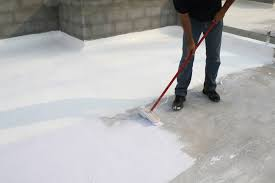This post will review the benefits of floor waterproofing services and the methods used to achieve good results.
For any homeowner, water damage may be a nightmare. A building’s structural integrity may be jeopardized if moisture seeps through the flooring, resulting in expensive damage. Floor waterproofing services can help in this situation.

Advantages of Waterproofing Services for Floors
Defence Against Moisture Damage
Protection from moisture damage is one of the main advantages of floor waterproofing. Moisture can cause havoc on flooring, causing warping, mould development, and other issues, whether from rain, floods, or leaks. You may safeguard your property from harm and save expensive repairs by waterproofing your flooring to stop moisture from reaching the surface.
A rise in property values
Additionally, floor waterproofing can raise the value of your home. Properties protected against moisture damage are more appealing to prospective purchasers and can sell for more money. Additionally, waterproof floors can give your home a more upscale, businesslike appearance, which will appeal to tenants and potential customers.
A better indoor environment
The improvement of indoor air quality is another advantage of floor waterproofing services. Moisture can encourage the formation of mould and mildew, which can result in respiratory troubles and other health concerns. You can lessen the chance of mould formation and create a healthy indoor environment by preventing moisture from entering your flooring.

Different Methods Of Waterproofing for Floors
Coating With Epoxy
A well-liked approach to waterproofing floors is with epoxy coatings. Epoxy is a robust, long-lasting substance that is moisture- and foot traffic-resistant and can survive severe use. Concrete, wood, and other surfaces can be coated with epoxy to provide a waterproof barrier that guards against damage to the floor. Epoxy coatings also come in various colours and textures, making it simple to personalise your flooring to your preferences.
Waterproofing using membrane
Membrane waterproofing entails covering a floor’s surface with a waterproof membrane. Asphalt, rubber, or PVC are just a few materials that may be used to create this membrane. Although membrane waterproofing is frequently used for outside surfaces like balconies and rooftops, it may also be utilised inside. It offers a dependable and powerful barrier to moisture.
Concrete Waterproofing
The process of cementitious waterproofing entails covering a floor’s surface with cement. Usually, chemicals are included with this coating to increase its water resistance. Concrete floors may be effectively and long-lastingly waterproofed using cementitious waterproofing.

FAQs
Q: Can waterproofing be done on any kind of flooring?
The
majority of flooring types can be waterproofed. Depending on the kind
of flooring and the needed level of protection, a unique technique will
be employed. To find the finest waterproofing option for your flooring,
consult a specialist.
Q: Where can I get services for floor waterproofing?
A: You may look for floor waterproofing services online, in your local phone book, or by asking friends or contractors for recommendations.
Final Talk
For any property owner wishing to safeguard their building from moisture damage, raise its value, and enhance indoor air quality, floor waterproofing services are a crucial investment. It’s simple to select a method that satisfies your particular requirements because there are a variety of approaches accessible, including epoxy coatings, membrane waterproofing, and cementitious waterproofing. To begin safeguarding your flooring and property, get in touch with a reputable floor waterproofing provider right now.